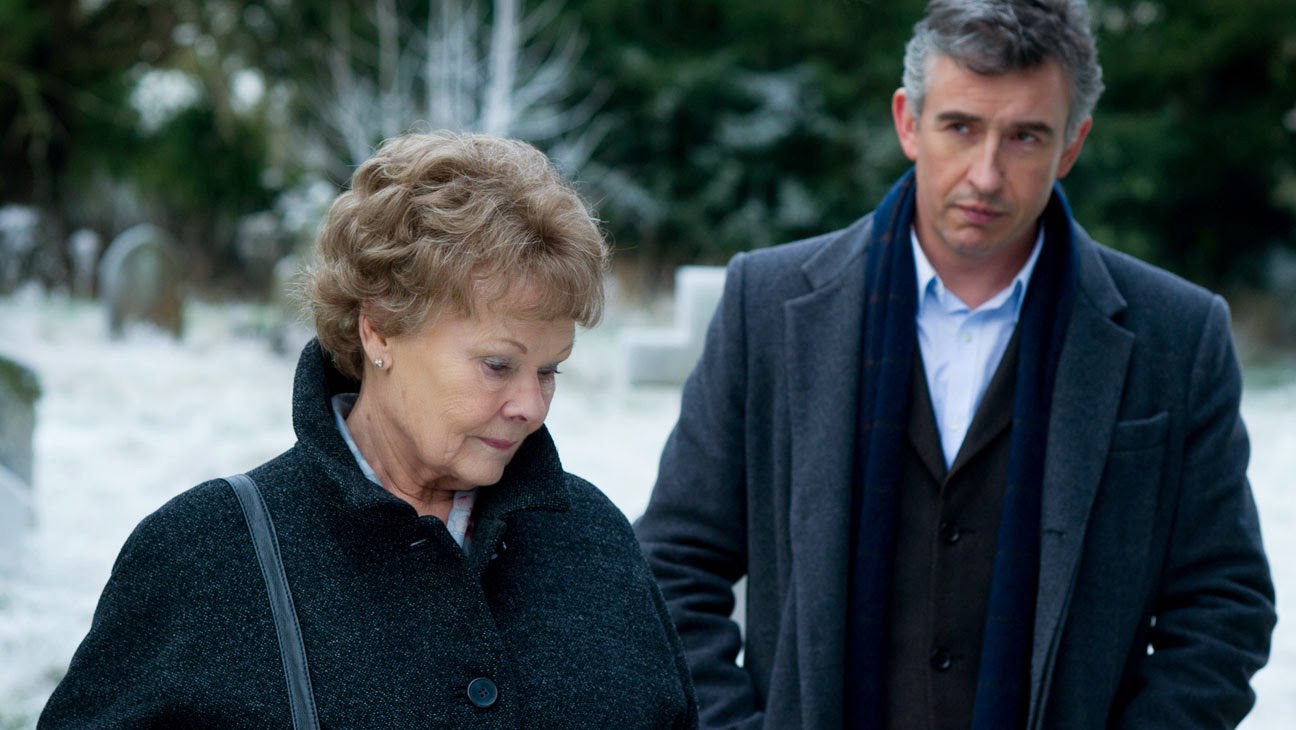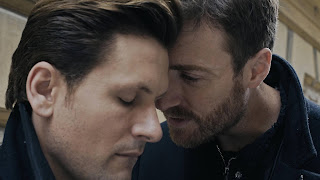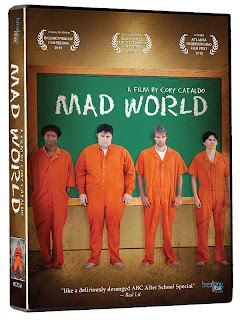DVD Review - Philomena
I wanted to see all the films nominated for Best Picture around the time of the 86th Academy Awards. This is the last one for me to review. It was up for four Oscars, including Best Picture, Best Music, Best Writing and Best Actress. It lost all four, but I think its nominations were deserved. Based on the book The Lost Child of Philomena Lee by Martin Sixsmith, this is the story of how former BBC News journalist and Prime Minister press secretary Martin Sixsmith, played by Steve Coogan, met retired nurse Philomena Lee, played by Judi Dench, and helped her to find her long lost son, originally named Anthony.
The movie deals with a very serious subject in which a woman has her toddler son taken away by prudish nuns and the Catholic Church. She then has to deal with not knowing what happened to him for almost 50 years. Yet, there is comedy to this film and a lot of it comes through Dench's performance and her character's relationship with Coogan's character.
The screenplay by Steve Coogan himself and Jeff Pope throws together these two contrasting characters on a road trip. This is not unfamiliar territory for Coogan. He recently wrote and starred in the film The Trip (2011), which also throws two contrasting characters on a road trip. For this film, the way in which the two characters contrast is in their beliefs. Philomena is a devout Irish-Catholic, whereas Martin is practically an atheist.
What's great is that these opposing beliefs aren't expressed in grand debates between the two while driving in the car. They do take issue with each other on one occasion, but it's not a constant back-and-forth. Where the contrasts come out is in certain behavioral actions. Her tactics to dealing with things or people clashes with his tactics. One breakfast scene is an example where how they respond to something shows their contrast just as much as if they had some long verbal match.
The dynamic between Philomena and Martin come to a head at the very end in a very powerful and well-acted scene between Dench and Coogan. It's very simple but resonates so strongly, and in one great punch it also exposes the hypocrisy and the narrow-mindedness, as well as the un-Christ-like practices within the Catholic Church.
Yet, at the same time, this movie is not a condemnation of the Church, or an attack against it. Philomena never loses faith or sight of her beliefs and values. Her love and forgiveness, which are fundamental in the teachings of the Church, are two things she doesn't allow to leave her spirit at any point. Yes, she makes her mistakes. Yes, she has horrible things done to her, but she maintains her love and forgiveness.
This movie is not How to Survive a Plague (2012), but it does have a brief education on AIDS and HIV in relation to Republican politics in the 1980s and early 90s. One of the characters turns out to be gay and Coogan's script properly addresses the issues, surrounding what a gay person would have to handle back in that time. It's handled delicately in the hands of director Stephen Frears who has dealt with gay issues in films like My Beautiful Laundrette (1985) and Prick Up Your Ears (1987).
Five Stars out of Five.
Rated PG-13 on appeal for some strong language, thematic elements and sexual references.
Running Time: 1 hr. and 38 mins.
The movie deals with a very serious subject in which a woman has her toddler son taken away by prudish nuns and the Catholic Church. She then has to deal with not knowing what happened to him for almost 50 years. Yet, there is comedy to this film and a lot of it comes through Dench's performance and her character's relationship with Coogan's character.
The screenplay by Steve Coogan himself and Jeff Pope throws together these two contrasting characters on a road trip. This is not unfamiliar territory for Coogan. He recently wrote and starred in the film The Trip (2011), which also throws two contrasting characters on a road trip. For this film, the way in which the two characters contrast is in their beliefs. Philomena is a devout Irish-Catholic, whereas Martin is practically an atheist.
What's great is that these opposing beliefs aren't expressed in grand debates between the two while driving in the car. They do take issue with each other on one occasion, but it's not a constant back-and-forth. Where the contrasts come out is in certain behavioral actions. Her tactics to dealing with things or people clashes with his tactics. One breakfast scene is an example where how they respond to something shows their contrast just as much as if they had some long verbal match.
The dynamic between Philomena and Martin come to a head at the very end in a very powerful and well-acted scene between Dench and Coogan. It's very simple but resonates so strongly, and in one great punch it also exposes the hypocrisy and the narrow-mindedness, as well as the un-Christ-like practices within the Catholic Church.
Yet, at the same time, this movie is not a condemnation of the Church, or an attack against it. Philomena never loses faith or sight of her beliefs and values. Her love and forgiveness, which are fundamental in the teachings of the Church, are two things she doesn't allow to leave her spirit at any point. Yes, she makes her mistakes. Yes, she has horrible things done to her, but she maintains her love and forgiveness.
This movie is not How to Survive a Plague (2012), but it does have a brief education on AIDS and HIV in relation to Republican politics in the 1980s and early 90s. One of the characters turns out to be gay and Coogan's script properly addresses the issues, surrounding what a gay person would have to handle back in that time. It's handled delicately in the hands of director Stephen Frears who has dealt with gay issues in films like My Beautiful Laundrette (1985) and Prick Up Your Ears (1987).
Five Stars out of Five.
Rated PG-13 on appeal for some strong language, thematic elements and sexual references.
Running Time: 1 hr. and 38 mins.











Comments
Post a Comment